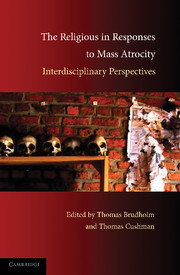Book contents
- Frontmatter
- Contents
- List of Contributors
- Acknowledgments
- Introduction: The Religious in Responses to Mass Atrocity
- Part I Between Necessity and Impossibility: The Role of Religion in the Face of Atrocity
- Part II Does It Help to Import Religious Ideas: Reflections on Punishment, War, and Forgiveness
- Part III Sociologies of the Religious in Responses to Mass Atrocities
- 7 Making Whole: The Ethics and Politics of “Coming to Terms with the Past”
- 8 When Faith Meets History: The Influence of Religion on Transitional Justice
- 9 Genocidal Rupture and Performative Repair in Global Civil Society: Reconsidering the Discourse of Apology in the Face of Mass Atrocity
- 10 Violence, Human Rights, and Piety: Cosmopolitanism versus Virtuous Exclusion in Response to Atrocity
- Index
8 - When Faith Meets History: The Influence of Religion on Transitional Justice
Published online by Cambridge University Press: 01 September 2009
- Frontmatter
- Contents
- List of Contributors
- Acknowledgments
- Introduction: The Religious in Responses to Mass Atrocity
- Part I Between Necessity and Impossibility: The Role of Religion in the Face of Atrocity
- Part II Does It Help to Import Religious Ideas: Reflections on Punishment, War, and Forgiveness
- Part III Sociologies of the Religious in Responses to Mass Atrocities
- 7 Making Whole: The Ethics and Politics of “Coming to Terms with the Past”
- 8 When Faith Meets History: The Influence of Religion on Transitional Justice
- 9 Genocidal Rupture and Performative Repair in Global Civil Society: Reconsidering the Discourse of Apology in the Face of Mass Atrocity
- 10 Violence, Human Rights, and Piety: Cosmopolitanism versus Virtuous Exclusion in Response to Atrocity
- Index
Summary
Over the past couple of decades, a historically unusual concatenation of societies – Germany, Rwanda, Guatemala, South Africa, and so many others – has confronted the injustices of their past, ranging from systematic authoritarian suppressions to the mass atrocities of communal conflict. Words and images persist: defiant dictators in the docket at the trial of the century (of which the last century featured many), relatives facing the killers of their kin at truth commissions, debates over reparations, and typically a surrounding clamor of charges and countercharges: victors' justice, no justice, stunted justice, retributive justice, perverted justice, restorative justice, injustice. Occasionally, the clamor has yielded a long awaited just verdict, a head of state's healing speech, or a genuine expression of repentance and forgiveness, moments where “hope and history rhyme,” in the words of Irish poet Seamus Heaney.
In these diverse scenes, one often descries miters, beards, clerical robes, pectoral crosses, or clusters of women chanting prayers. In the politics of transitional justice, religion is often, though not always, involved. Journalists and chroniclers sometimes have made much of this involvement, but not usually scholars, few of whom have sought to chart it systematically (exceptions are Graybill, 2001; Vinjamuri and Boesenecker, forthcoming). To be sure, theologians have written about the ethics of transitions, many of them urging reconciliation and forgiveness (de Gruchy, 2003; Schreiter, 1998; Volf, 1996).
- Type
- Chapter
- Information
- The Religious in Responses to Mass AtrocityInterdisciplinary Perspectives, pp. 174 - 212Publisher: Cambridge University PressPrint publication year: 2009
- 2
- Cited by



